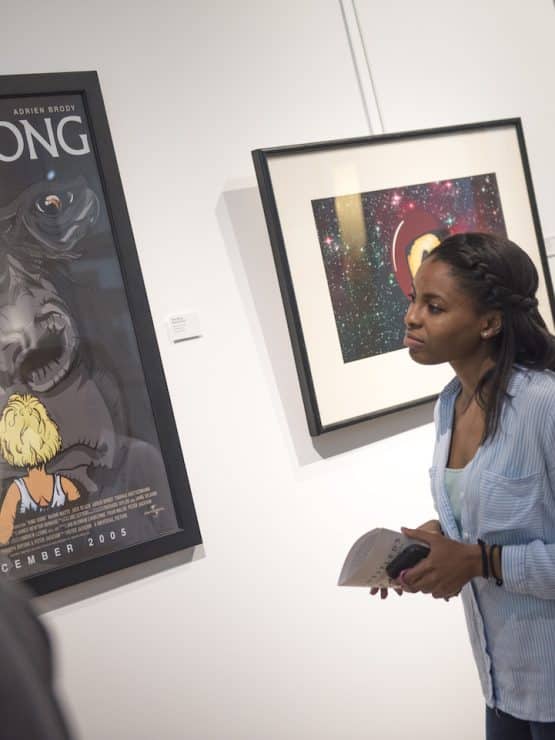
Art Education
Do you enjoy the arts, culture, and expressing yourself though visual mediums? Methodist University’s Educational Studies with a concentration in Art Education major may be for you. Through a rigorous series of foundational, historical, and studio art classes, we will prepare you for a career in Art Education. We will also give you an opportunity to earn professional licensure requirements during your education at MU.
Common Career Paths
Some of the top jobs for those with a bachelor’s degree with Art Education include art teacher, art historian, art professor, art auctioneer, art dealer, museum curator, poet, museum exhibit designer, and more. Teacher licensure may be required for some of these positions.
Common Salary Ranges for Graduates
As mentioned above, there’s a long list of career opportunities for those with Art Education degrees. But, the U.S. Bureau of Labor Statistics reports the average annual salary for the following positions (which may require additional education) in North Carolina in 2021:
- Archivist, curator, and museum technician: $58,830
- Museum technician and conservator: $52,030
- Exhibit designer: $62,960
- Art, drama, and music teacher: $86,240
Teacher licensure may be required for some of these positions.
Average Tuition Cost
The average cost for an incoming residential freshman to attend MU is less than $18,000 – similar to the cost of attending one of the big-box public schools, but with the enhanced value of a highly-regarded private school with a 12:1 student-to-faculty ratio.
While tuition varies, depending on a student’s financial aid package, it’s important to know that the average financial award for an incoming residential freshman at MU is more than $34,000.
Financial Aid & Scholarships
More than 97% of MU students receive some form of financial aid, with the University offering more than $24 million annually to students for scholarships. If a student is active military, family of active military, or a veteran, they may also qualify for MU’s military education benefits.
Interested in Methodist University’s Educational Studies with a concentration in Art Education major?
If you have questions, reach out to Dr. Courtney Samuelson using the contact info at the bottom of the page. If you’re ready to apply today, click the button below!
Major Requirements
The major in Educational Studies with a concentration in Art Education consists of 72-75 credits, distributed as follows:
Required Courses
24-27 credits
| EDU 1420 Field Experience I (1) | EDU 4070 Professional Orientation (2) |
| EDU 2400 Instructional Technology (2) | EDU 4190 Seminar in Positive Behavior Development (3) |
| EDU 2420 Field Experience II (1) | EDU Elective from chosen licensure content area (3-4) |
| EDU 2510 Foundations of Education (3) | EDU Elective from chosen licensure content area (3-4) |
| EDU 3300 Educational Psychology (3) | EDU Elective from chosen licensure content area (3-4) |
Required Area Content Courses
Select a minimum of 24 credit hours from the following list:
| ART 1010 2D Design (3) | ARH 1510 Language of Art (3) |
| ART 2030 Foundations Drawing I (3) | ARH 2530 Survey of Art History I (3) |
| ART 2050 Foundations Painting I (3) | ARH 2540 Survey of Art History II (3) |
| ART 3090 Relief Printmaking (3) | AGD 1000 Design Production (3) |
This course work will be identified based on the program (degree of study) from which the student is transferring. Courses will be selected from the original degree of study to align with the candidate’s desired teacher licensure area as defined by the NC Residency Licensure requirements. Relevant coursework will be selected in the content area in which a student will seek licensure through an alternative licensure program upon graduation. All area content courses are selected and approved for each student by the department chairperson and teacher education committee content area representative.
Required Elective Courses
24 credits (minimum)
All elective courses are selected and approved for each student by the department chairperson and teacher education committee content area representative. Selected courses will best prepare students for continued studies in the field of education through an alternative licensure program.
NC State Board of Education Complaint Process
The North Carolina State Board of Education (SBE) has jurisdiction to investigate allegations of noncompliance regarding specific laws and rules. Complaints may address Educator Preparation Program requirements set forth in Article 15(D) of Chapter 115C. The SBE does not have jurisdiction over complaints related to contractual arrangements with an EPP, commercial issues, obtaining a higher grade or credit for training, or seeking reinstatement to an EPP. All complaints filed with the SBE must be in writing. A person or entity may file a written complaint with SBE by filling out a complaint form and submitting online and/or mailing or faxing a hard copy to the address on the form.
Contact
Courtney Samuelson, Ph.D.

